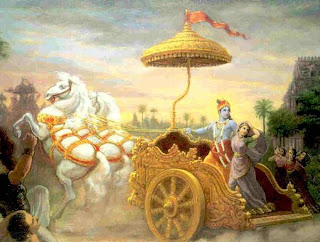India is a land abounding in Saints and sages. Humbly we bow to God. His vibhutis alone can bless our life, wisdom and intellect. Many birthdays in the May Calendar of 2008 prove this fact. The important dates of this month are listed below.
a) Sri Vallabhacharya Jayanti is on 2nd May, Friday. He established the Sri Nathji tradition and Pushtimarg. Famous poets Soordassji and Nanddassji were His disciples popularly known as "ASHTA CHHAP " poets from the Bhakti-period of Hindi literature. On this day we have Varuthini ekadasi also.
At 6 am we have stuti of Sri Nathji. One can also enjoy ancient Acharya Vallabhachryaji on GITAJI and at holy feet of Mahaprabhu Vallabhacharyaji.
b) Akshay Teej is on 8th May, Thursday. It is the only occasion when Lord Bankey Bihariji gives His charan-darshan once in a year, with millions of people thronging the temple.
It's Sri Parshuram Jayanti also . ....sharing Saint Ushaji's special moments at Yamunaji. Some are celebrating Akshay Teej on 7th May, a Wednesday.
c) Sri Shankaracharya Jayanti is on 10th May, Saturday.
- The person who revived Sanatan Dharma since ritualistic frauds and imposters were misguiding innocent folk and the general public.
- He wrote the most beautiful commentaries 'Teeka' on Gitaji, Srimad Bhagwatam and also inked many Strotas in praise of the Lord and Goddess.
On 10th May is also Sri Soordass Jayanti who was one of the Asht-chhap poets during the Srinathji or Vallabharcharyaji era.
d) The very next day is Sri Ramanujacharya Jayanti on 11th May. He is hailed as one of the four main Acharyas of Sanatan Dharma.
e) On 13th May, Tuesday is Sri Sitanaumi. Recently read verses 200-250 of the 'Baalkand' where dhanush yagna is going on and Saint Tulsidassji explains the beauty of Sita mata....-- Lord Rama , Bharat-Shatrughan-Laxmanji - Lord Hanumaan -- sage Yagvalkyaji and Goswami Tulsidassji .....after listening to Sunderkand at CHITRAKOOT
f) On 15th May, Thursday is Sri Hitharivanshji Jayanti. He established the Sri Radhavallabh temple and Sampraday at VBN.
Same day is Mohini Ekadasi too. The day Lord Vishnu incarnated Himself as Mohini Bhagwan to snatch nectar from the demons .
g) On 18th May we have Sri Narsingh Jayanti, when Lord Vishnu became Narsingh Bhagwan to kill Hiranyakashipu and save Bhakta Prahaladji.
Sri Narsingh Bhagwan is the family-deity of Saint Manoharji and thus He keeps a fast to celebrate His Deity's appearance day or Narsingh Jayanti. He along with all devotees also visit Sri Narsingh Temple in Vrindavan, located near Sri Banke Bihariji or Radharamanji temple.
h) 19th May, Monday is not only sage Narad Jayanti and Lord Budha's birthday but also the appearance day of Lord Radharamanji in the Chaitanya Mahaprabu tradition at Vrindavan.
i) 24th May is Maa Anandmayi Jayanti as well as Golok-gaman day of 20th Century's Lord Chaitanya, Sri Maharajji. Thus poojya Manoharji shall reach Lalji's home for the Utsav.
As per the Hindu calendar, Maharajji's Utsav at Vrindavan is on 31st May.
Thus May 2008 which starts with Sri Vallabhacharya Jayanti ends with Maharajji's utsav! We have festivals galore in a single month this time round .























